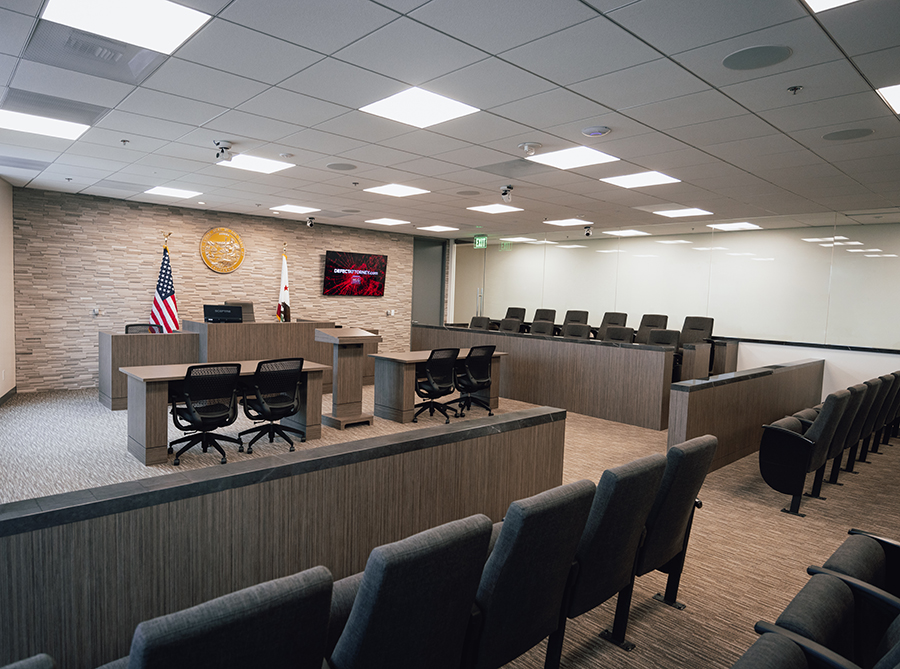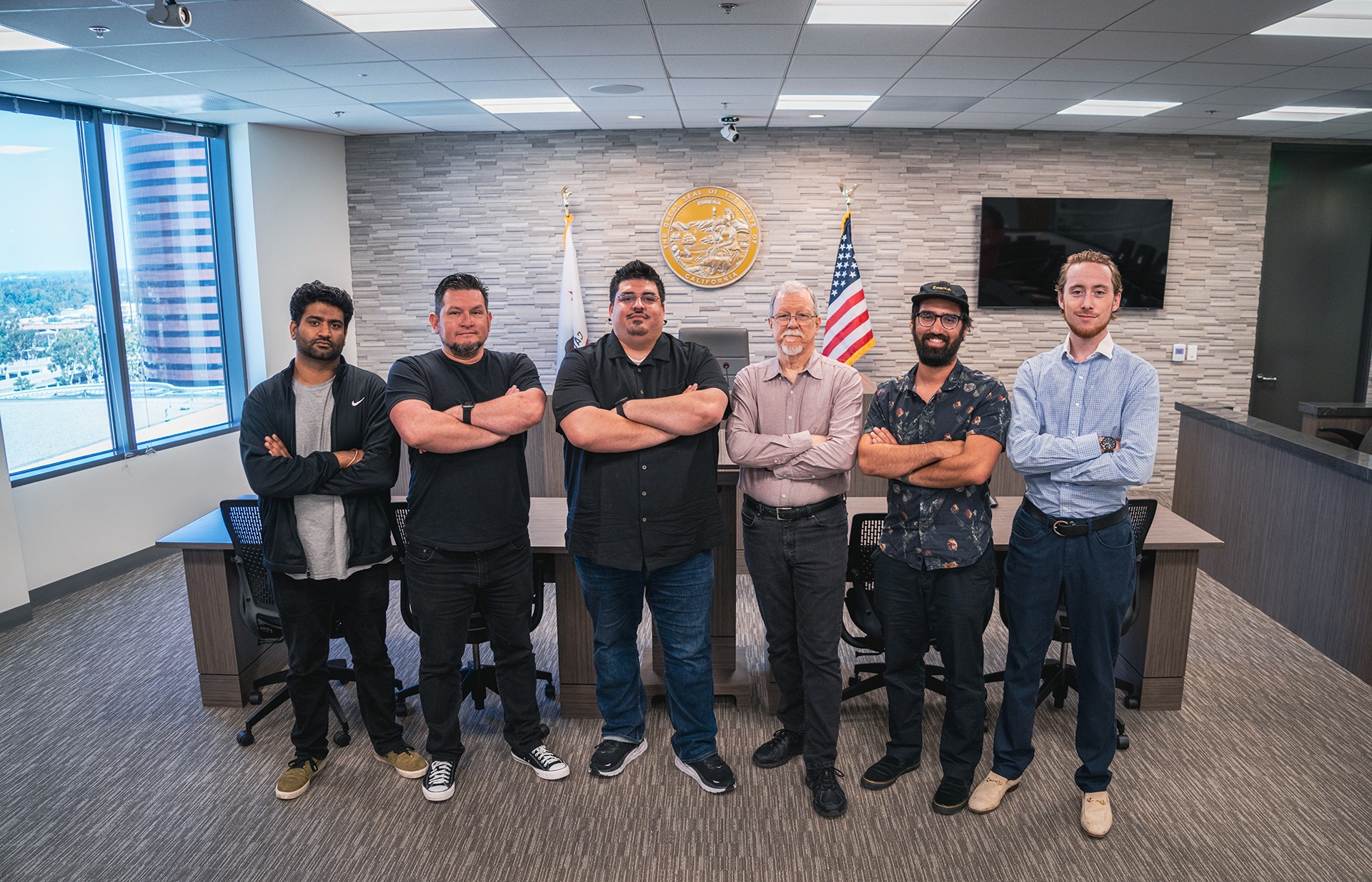
For trial attorneys, practice is the lifeblood of success. They meticulously refine every aspect of a case through relentless repetition. While hotel conference rooms have long been the go-to choice for trial preparations, they fail to capture the essence of a real courtroom environment. Imagine a football player practicing on synthetic turf, ill-prepared for the game played on the grass.
After months of devoted work and detailed planning, MLG Attorneys at Law, located in Costa Mesa, California, proudly unveiled the Supreme Court Justice Carlos R. Moreno Courtroom. This achievement is more than just a project completion; it is the realization of a 25-year dream, passionately pursued and ultimately fulfilled by MLG Principal Jonathan Michaels.
Down to the Last Detail
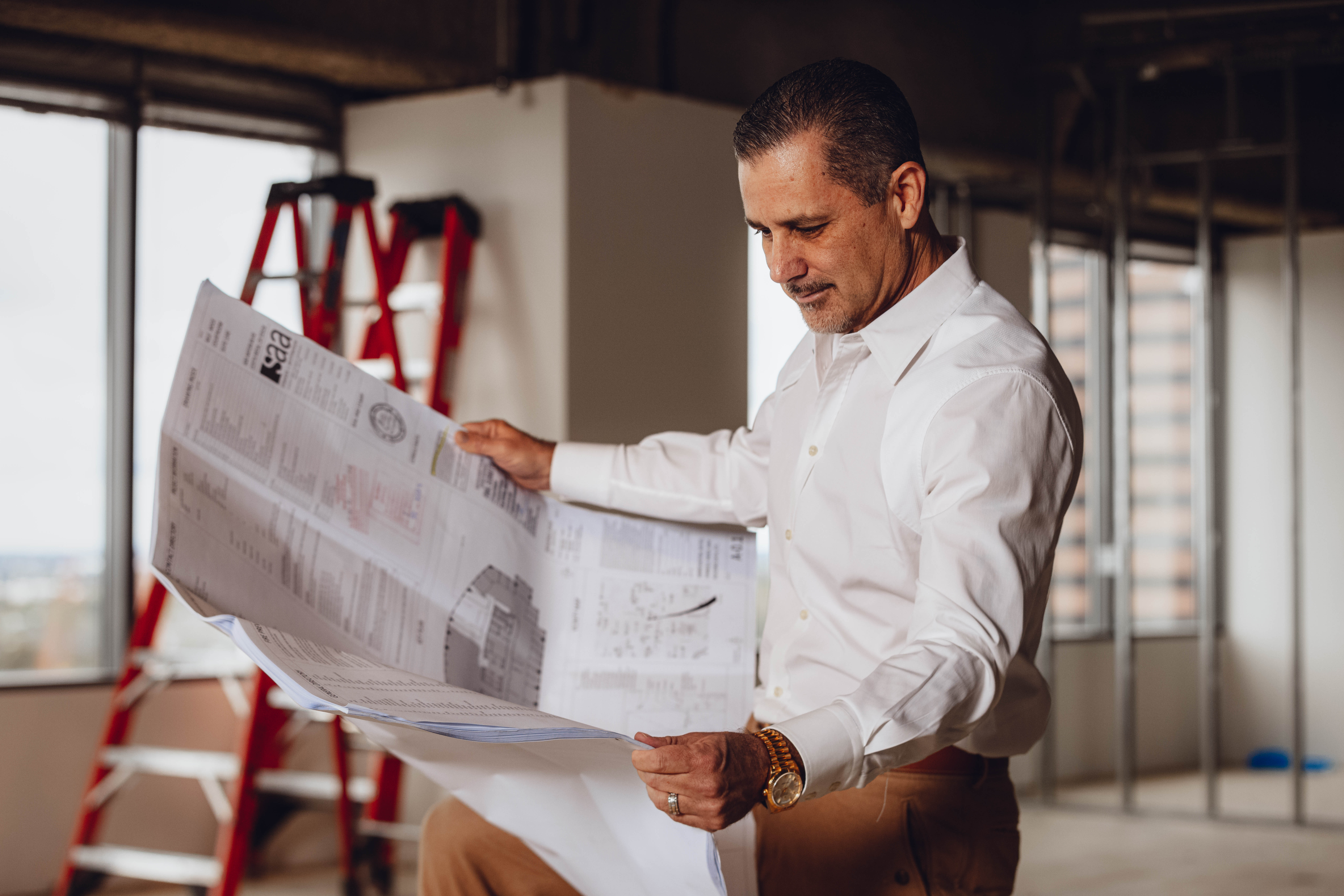
"We wanted to create an environment that doesn’t just mimic, but essentially replicates the real-world experience of trial proceedings."
Constructed to mirror a real courtroom down to the last detail, this cutting-edge mock courtroom is more than just a space. It's an experience. By accurately capturing all the tactile elements of a real courtroom, it offers trial attorneys an authentic and tangible environment to rigorously refine their skills. It isn't just about bridging a gap—it's about completely redefining the way trial preparations are carried out, marking the dawn of a new era in litigation practice.
"We wanted to create an environment that doesn’t just mimic, but essentially replicates the real-world experience of trial proceedings," said Michaels. "We needed a space that was not just about aesthetics, but also functionality and technological proficiency. That's why we embedded advanced AV technology in every aspect of the courtroom design."
The technical aspects of the project were handled by MLG’s director of Information Technology, Harpartaap Sidhu. As an experienced IT professional, Sidhu faced the challenge of integrating modern technology into a setting that needed to maintain the authenticity of a traditional courtroom. The balance he sought to strike involved the incorporation of features such as high-quality video, real-time recording, and secure live-streaming capabilities without these elements being obtrusive or detracting from the realistic courtroom environment. Maintaining the integrity of the setting while enhancing its functionality was a significant part of this task. It was not without its hurdles.
“We were threading the needle,” said Sidhu. “Our aim was to make technology an enabler, not a disruptor.”
Forensic Media
When it came time to select the necessary video technology for the project, the firm didn't have to look far. Already on staff was a highly skilled team of forensic media specialists, typically tasked with creating high-quality "day in the life" videos often used in litigation and producing extremely detailed crash reconstruction animations. The in-house team included senior forensic videographer Jake Rascon, senior forensic animator Bill Mings, forensic animator Vince Ibarra, forensic editor Xander Tillou, and forensic technician Ray Pontanillo.
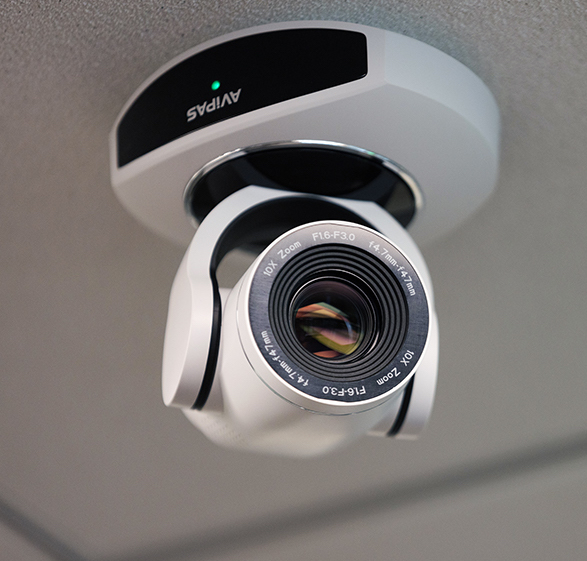
“The heart of our setup is the Avipass camera system," Sidhu said. "Six cameras, streaming in 4K resolution, provide a comprehensive view of the entire courtroom. These power over ethernet (PoE) devices are isolated on a local area network (LAN) with no outgoing or incoming internet traffic." The Avipas AV-1281, a PTZ camera with a 10x optical zoom, was the camera of choice. It offers a comprehensive angle of view, ranging from 6.4 to 61 degrees and a pan rotation range of up to 170 degrees, operating at up to 1080p at 60 frames over the HDMI interface—or 1080p at 30 frames over the RJ45 connector interface (PoE).
The cameras are cabled from the courtroom into a state-of-the-art control room from over the ceiling tile. These cameras are both uplinked via RJ45 for PoE as well as HDMI. The camera HDMIs are linked into a Blackmagic Design ATEM Mini Extreme, which serves as the production switcher for live streaming and recording. The ATEM Mini is connected to the Windows 11 laptop via USB-C interface. It comes with its own software where the AV team can sign in to streaming platforms such as YouTube, Facebook Live, Skype, Twitch, Zoom, Microsoft Teams and anything that will support RTMP protocols.
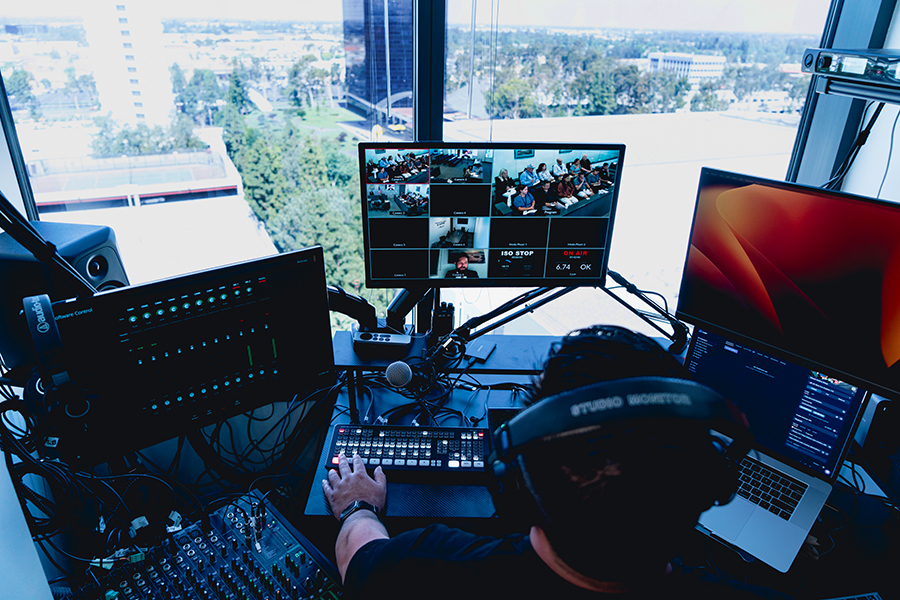
Keeping Control
The control room is where all the technology in the courtroom comes together. At the helm of audio control is the Shure Pro FX-16, a 16-channel mixer. This sophisticated device has been configured to regulate the four Audix M70 ceiling microphones and eight Sonance ceiling speakers, ensuring crystal-clear audio transmission and reception.
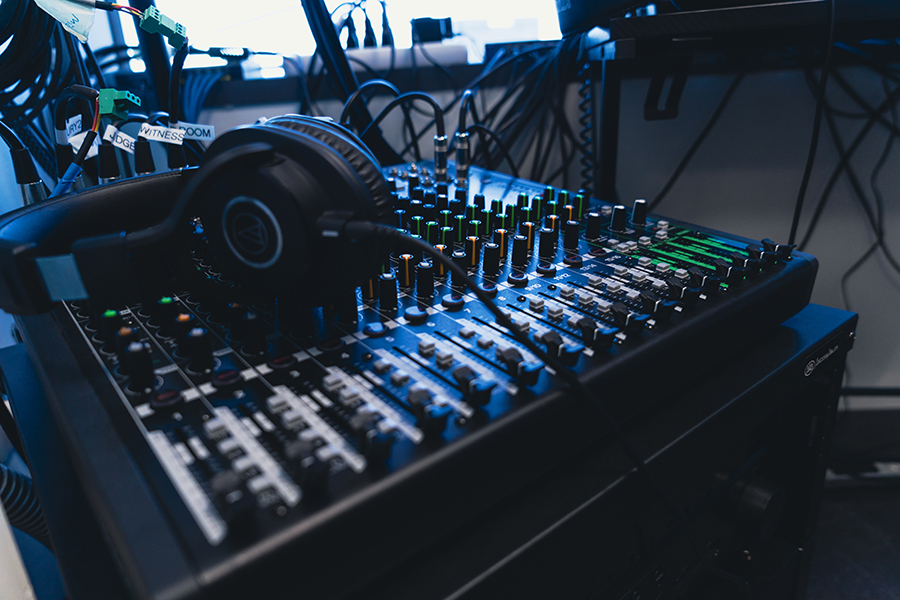
Complementing the advanced mixer setup, the Yamaha RX-V385 natural sound receiver is another key component of the control room's tech stack. This high-performance AV receiver goes beyond simple audio transmission; it also feeds video and airplay to all three TVs in the courtroom concurrently, delivering a fully synchronized and immersive experience.
Achieving seamless technical integration within the traditional office infrastructure was not without challenges. "Wiring was the trickiest part of the project," admits Sidhu. "We had to integrate modern, high-speed ethernet cabling into an established office environment, keeping aesthetics and functionality intact. But all this effort pays off when you see the capabilities, especially the ease of live streaming."
Live streaming was a core component of the project's vision. "In an increasingly connected world, we knew we had to go beyond the confines of the physical space," said Sidhu. "Live streaming allows us to extend the courtroom experience to our remote offices and facilitates real-time collaboration and learning."
Thoroughly Prepared
With the right equipment in place and a dedicated team leveraging their technical skills, the Supreme Court Justice Carlos R. Moreno Courtroom at MLG Attorneys at Law now stands as a testament to the power of combining technology with legal practice. It's not just a courtroom; it's a platform for trial attorneys to hone their skills, deepen their understanding of the case at hand, and ultimately, deliver justice for their clients.
“As a judge, I've seen the value of 'courtroom comfort'—a level of ease and familiarity attorneys have when the courtroom feels like their own turf.”
Justice Moreno
According to Michaels, the exceptional transparency opens new avenues for attorneys and clients based remotely. "Having the ability to view proceedings live, to scrutinize reactions, and provide feedback in real-time is an invaluable tool. This interactive engagement allows our on-site attorneys to adjust and refine their strategies on the spot," he explained. "Such immediate collaboration not only enhances the potency of our trial preparations but also introduces a previously absent immediacy and relevance to the entire process."
Building the courtroom within the firm’s existing office space was also a conscious decision. Michaels insisted on having the courtroom within arm's reach. "Attorneys should be able to walk in and conduct mock trials, arrange focus groups, or test new approaches at their convenience. Proximity to our team enhances the utility and value of the space,” said Michaels. In the mock courtroom’s infancy, MLG has already conducted more than ten mock trials in the first month, which is more than they would typically do in a year.
The naming of the courtroom is a tribute to retired California Supreme Court Justice Carlos R. Moreno. His career has been a source of inspiration and a beacon of dedication to justice, principles which are at the heart of MLG Attorneys at Law. Justice Moreno also recognizes the importance of thorough preparation and composure among attorneys in the courtroom.
“As a judge, I've seen the value of 'courtroom comfort'—a level of ease and familiarity attorneys have when the courtroom feels like their own turf,” said Justice Moreno. “I eagerly anticipate the future generation of attorneys and young law students leveraging this dynamic space to hone their skills and nurture their courtroom confidence."
